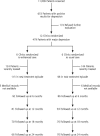RCT of a care manager intervention for major depression in primary care: 2-year costs for patients with physical vs psychological complaints
- PMID: 15671186
- PMCID: PMC1350976
- DOI: 10.1370/afm.216
RCT of a care manager intervention for major depression in primary care: 2-year costs for patients with physical vs psychological complaints
Abstract
Purpose: Depression care management for primary care patients results in sustained improvement in clinical outcomes with diminishing costs over time. Clinical benefits, however, are concentrated primarily in patients who report to their primary care clinicians psychological rather than exclusively physical symptoms. This study proposes to determine whether the intervention affects outpatient costs differentially when comparing patients who have psychological with patients who have physical complaints.
Methods: We undertook a group-randomized controlled trial (RCT) of depression comparing intervention with usual care in 12 primary care practices. Intervention practices encouraged depressed patients to engage in active treatment, using nurses to provide regularly scheduled care management for 24 months. The study sample included 200 adults beginning a new depression treatment episode where patient presentation style could be identified. Outpatient costs were defined as intervention plus outpatient treatment costs for the 2 years. Cost-offset analysis used general linear mixed models, 2-part models, and bootstrapping to test hypotheses regarding a differential intervention effect by patients' style, and to obtain 95% confidence intervals for costs.
Results: Intervention effects on outpatient costs over time differed by patient style (P <.05), resulting in a $980 cost decrease for depressed patients who complain of psychological symptoms and a 1,378 dollars cost increase for depressed patients who complain of physical symptoms only.
Conclusions: Depression intervention for a 2-year period produced observable clinical benefit with decreased outpatient costs for depressed patients who complain of psychological symptoms. It produced limited clinical benefit with increased costs, however, for depressed patients who complain exclusively of physical symptoms, suggesting the need for developing new intervention approaches for this group.
Figures


References
-
- Kraemer HC, Wilson T, Fairburn CG, Agras WS. Mediators and moderators of treatment effects in randomized clinical trials. Arch Gen Psychiatry. 2002;59:877–883. - PubMed
-
- Zimmerman M, Coryell W. The inventory to diagnose depression (IDD): a self-report scale to diagnose major depressive disorder. J Consult Clin Psychol. 1987;5:55–59. - PubMed
Publication types
MeSH terms
Grants and funding
LinkOut - more resources
Full Text Sources
